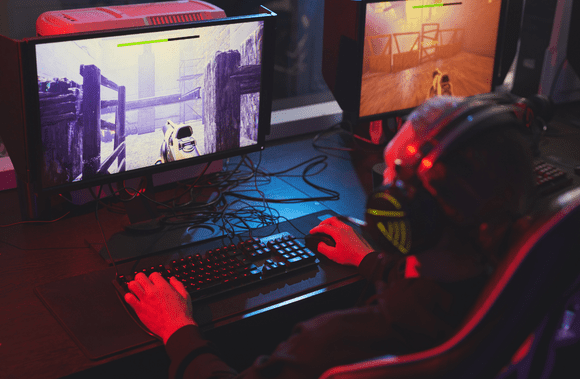The vast majority of gamers everywhere have an intimate command of the terminology and slang unique to their favorite games. There are several instances in online games where players need to quickly communicate with their teammates. Gamer lingo is also useful because yelling out complete sentences during battle is counterproductive.
Some terms and jargon in the gaming industry are universal, while others are used primarily in a specific subset of games. So, without further ado, let’s dive into the most common gamer lingo and terms used in the gaming industry.
Most common gamer lingo slangs every gamer should know
AFK
Type AFK in game chat to let your teammates know you’ll be unavailable for a while.
GG
To “have a good game,” or “GG,” is a common gaming expression. Used generally after finishing an online multi-player match to let everyone know you enjoyed the game and your time spent with them.
Smurf
Remember, these little blue men are not the same ones you saw when you were a kid. The term “smurf” refers to a person with a high skill level who uses another player’s account or a “smurf account” to compete with players with a low skill set.
If you’re one of the tortured players with inferior skills, Gargamel can’t help you from these smurfs.
Aimbot
Those who employ illegal software known as “aimbots” have an unfair advantage in shooting games. Used mostly in first-person shooter multiplayer games played online, such as Counter-Strike: Global Offensive, auto-aim functions by resetting the bot’s aim automatically whenever an opponent player enters the screen.
Camping
In video games, “camping” refers to the approach of staying put in a strategically sound area of the playing field.
Bot
In video games, a bot is a character that is controlled by a computer. Video game bots are normally inaccessible to the player.
Buff/Nerf
When a weapon or tool’s statistics are increased thanks to the most recent patch, it is said to have been “buffed” in gamer lingo. Alternatively, a weapon is nerfed when it is considered subpar in comparison to other weapons that have similar or even worse statistics.
Toxic
Toxic’s comment is eSports jargon for a player who is frustrated with his or her own team or the other side. Most of the time, these negative influences can ruin a potential relationship with just a few choice words.
Bullet Sponge
In video games, the term “bullet sponge” is used to describe an enemy that is extremely difficult to destroy. Therefore, the term “bullet sponge” refers to characters who take a lot of damage from bullets before dying.
Cheesing
In video games, “cheesing” refers to strategies that require little in the way of knowledge or expertise from the player. Cheesers can often be seen exploiting bugs or using the same pattern of attacks on a boss level after level.
Cooldown
The cooldown of an ability is the bare minimum amount of time that must pass before the player may use it again. In video games, recharge time is the period of inactivity required before a character can once again make use of a previously utilized ability.
DLC
“DLC” is short for “downloadable content,” and it’s a term used in the gaming industry to describe extra materials developed for a game after its initial release. downloadable content, or DLC, can be paid for or given away for free. Typically, downloadable content expands a video game by including new levels or playable characters.
Easter Egg
A video game’s Easter egg can take any form the game’s creators see fit. It might be a picture, a clip from a video, or a hidden part of the gameplay. Despite their elusive nature, Easter eggs are always worth the search.
Grinding
When you do the same tasks over and over again in order to gain experience, you are grinding. Multiple factors contribute to the practice of “grinding” for XP, including the desire to quickly progress through the game, the availability of in-game purchases, and the time it takes to earn those purchases.
HUD
The abbreviation “HUD” stands for “heads-up display,” and it is used in video games to refer to the status bar or other visual indicators of the player character’s current condition.
K/D
The Kill/Death ratio (K/D) is a metric used to measure a player’s effectiveness in combat.
Lag
Online gaming experiences lag when there is a lag between the input (player action) and the output (reaction of the in-game character).
Ragequit
When a player gives up on a game out of anger or frustration after repeatedly losing, they are said to have ragequit. You’ve probably seen videos of frustrated players pounding their controllers or keyboards online; this is ragequitting, another term from the gaming world that you should steer clear of.
OP
The term “OP” (Overpowered) is commonly used in the gaming community to denote overpowered characters or items.
TTK
In video games, “time to kill” refers to how long it often takes to end a gunfight with an enemy player.
Poggers
Poggers is a gamer lingo name for gamers that has gained popularity on the Twitch streaming platform. The term “poggers” describes someone who is overly enthusiastic or happy.
Instalock
In multi-player games, “Instalocking” a character means making them unavailable for selection by any other players.
Pwned
When typing, it’s easy to confuse the words “Owned” and “Played” because they’re so close together on the keyboard. The term “pwned” is used in video games to describe when one player completely dominates another.
Clutch
When a player with a lower number of lives wins a round by eliminating their opponents one by one, they are said to be “clutch.”
Ganking
The term “ganking” originated in massively multiplayer online role-playing games (MMORPGs) and describes a coordinated attack by a large group of players against a single or small number of enemies.
Res
This word is exclusive to first-person shooter multiplayer games where certain characters have the ability to bring back the dead. Video games like Valorant and Rogue Company, for instance, heavily employ this vernacular.
Feeding
When the other side consistently eliminates you in each round of combat, they are feeding. Being dependable and helpful to coworkers, or shifting one’s stance or strategy, are all viable options for avoiding this.
Throwing
Throwing occurs when a team member disobeys orders and charges an adversary with the intention of dying by standing still and without firing their weapon. Players start tossing when they try to get other players to give up or leave the game.
FPS
The abbreviation “FPS” means “frames per second” in the context of video games. As the name suggests, a higher framerate results in a more fluid gaming experience. But that doesn’t mean the more frames per second you get, the better gamer you are.
NPC
A non-playable character (NPC) is, as the name implies, a character over whom the player has no direct influence. The bulk of video game NPCs have significant roles to play in the story.
To all the new players out there who are trying to learn the industry’s common terms, we hope you found this article to be both informative and entertaining. Finally, these 25 gaming slang terms round up the list; we want to know which ones you find most useful in everyday conversation.



